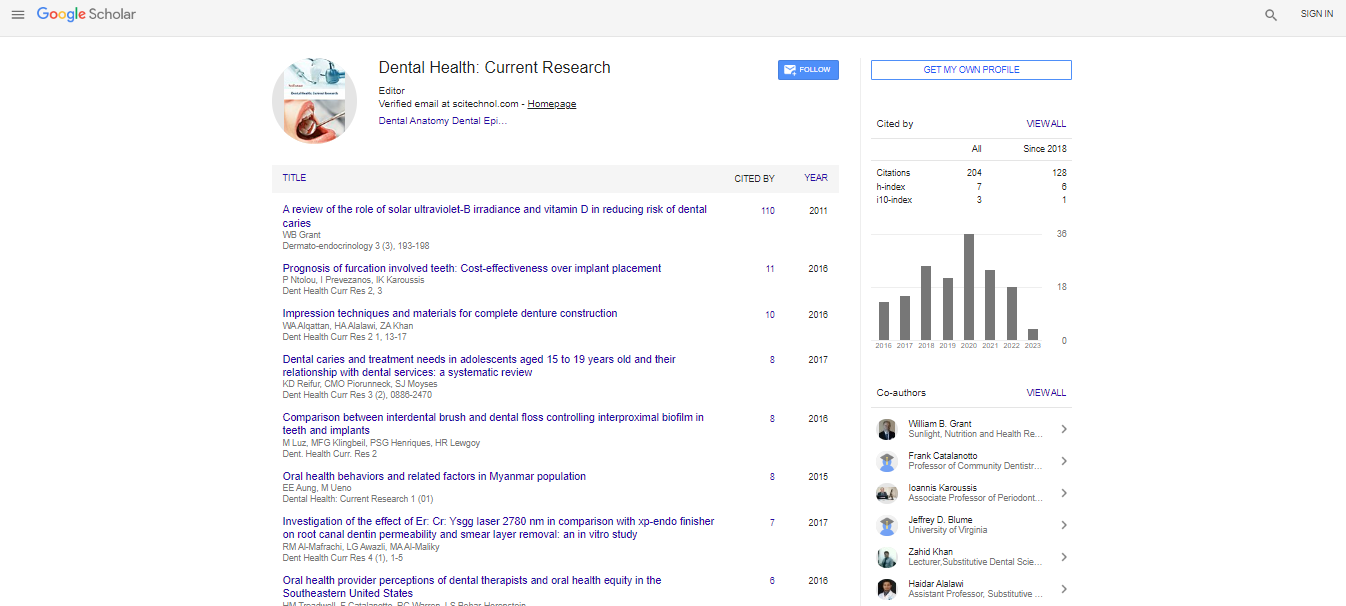Opinion Article, Dent Health Curr Res Vol: 9 Issue: 4
The Significance of Hospital Dentistry: Bridging Oral Health and Overall Healthcare
Chun Chiang*
1Department of Dentistry, National Taiwan University, Taipei, Taiwan
*Corresponding Author: Chun Chiang,
Department of Dentistry, National Taiwan
University, Taipei, Taiwan
E-mail: Chiangc134@ntu.edu.tw
Received date: 01 August, 2023, Manuscript No. DHCR-23-113065;
Editor assigned date: 03 August, 2023, PreQC No. DHCR-23-113065 (PQ);
Reviewed date: 17 August, QC No. DHCR-23-113065;
Revised date: 24 August, 2023, Manuscript No. DHCR-23-113065 (R);
Published date: 31 August, 2023, DOI: 10.4172/2470-0886.1000168
Citation: Chiang C (2023) The Significance of Hospital Dentistry: Bridging Oral Health and Overall Healthcare. Dent Health Curr Res 9:4.
Description
Dentistry is commonly associated with regular check-ups, cleanings, and the occasional filling. However, some dental cases require more specialized care and attention, and that's where hospital dentistry comes into play. Hospital dentistry serves as a vital component of the healthcare system, offering comprehensive dental care to patients with complex medical conditions, special needs, or those requiring surgical procedures that cannot be performed in a traditional dental office.
The role of hospital dentistry
Hospital dentistry bridges the gap between oral health and overall healthcare. It provides a unique setting for dental professionals to treat patients who might face challenges in receiving care in a traditional dental office. The primary objectives of hospital dentistry include-
Treating patients with special needs: Hospital dentistry caters to patients with special needs, including those with physical or developmental disabilities, cognitive impairments, or severe anxiety, who may require specialized care and sedation techniques.
Complex medical cases: Patients with complex medical conditions, such as cardiac issues, bleeding disorders, or compromised immune systems, often require dental treatment that is closely monitored and coordinated with their medical care.
Surgical procedures: Hospital dentistry is equipped to handle oral surgeries, such as jaw reconstruction, tumor removal, or facial trauma repair, which may necessitate the facilities and resources available in a hospital setting.
Surgical procedures: Hospital dentistry is equipped to handle oral surgeries, such as jaw reconstruction, tumor removal, or facial trauma repair, which may necessitate the facilities and resources available in a hospital setting.
Patients requiring hospital dentistry
Hospital dentistry serves a diverse range of patients, including-
Pediatric patients: Children with extensive dental needs, those with behavioral challenges, or those requiring surgery often benefit from hospital dentistry.
Adults with special needs: Adults with developmental disabilities, mobility issues, or severe dental anxiety can receive specialized care in a hospital setting.
Medically complex patients: Patients with underlying medical conditions like cancer, organ transplants, or heart conditions may require dental procedures coordinated with their medical treatment.
Dental procedures in the hospital setting
Hospital dentistry encompasses various dental procedures and treatments, including-
General anaesthesia and sedation: Hospital dentists are trained in administering anaesthesia and sedation to ensure the comfort and safety of patients during procedures.
Treatment for dental trauma: Patients with facial trauma, such as fractures or injuries, may receive immediate attention in the hospital.
Comprehensive dental care: Hospital dentists offer comprehensive dental care, ranging from preventive services to restorative treatments and prosthodontics.
The advantages of hospital dentistry
Hospital dentistry offers several advantages, including-
Specialized care: Dental professionals in a hospital setting have experience and training in handling complex cases and providing care for patients with unique needs.
Coordinated care: Collaboration between dental and medical teams ensures that patients with underlying medical conditions receive comprehensive, well-coordinated care.
Facilities and equipment: Hospitals are equipped with state-ofthe- art facilities and equipment necessary for surgeries and complex dental procedures.
Patient comfort: The availability of sedation options ensures that patients remain comfortable and relaxed during their dental treatment.
The hospital dentistry team
Hospital dentistry involves a multidisciplinary team, including-
Dentists: These professionals provide dental diagnosis and treatment, including surgical procedures.
Oral surgeons: Oral surgeons specialize in surgical interventions, such as extractions and reconstructive surgeries.
Anaesthesiologists: Anaesthesiologists administer anaesthesia or sedation to ensure patient comfort and safety during procedures.
Nurses and support staff: These individuals assist with patient care, pre-operative and post-operative care, and provide essential support throughout the dental treatment.
Conclusion
Hospital dentistry plays a vital role in delivering specialized dental care to patients who face unique challenges or require complex treatments. By offering comprehensive services, coordinating care with medical teams, and ensuring patient comfort and safety, hospital dentistry contributes to the overall well-being of individuals with diverse dental needs. Its role in the healthcare system underscores the importance of oral health in maintaining overall health and quality of life, making it an indispensable component of modern dentistry.
 Spanish
Spanish  Chinese
Chinese  Russian
Russian  German
German  French
French  Japanese
Japanese  Portuguese
Portuguese  Hindi
Hindi 